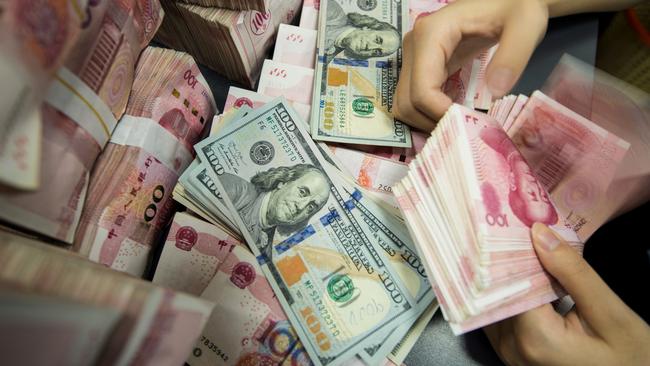
That’s creating relatively large risks for Australia even if the US avoids a recession.
While China’s sharemarket is hitting eight month lows, a potential panic and spillover to global financial markets like that of early 2016 has so far been avoided, yet it remains a risk.
The Shanghai Composite is almost flat for the year to date after rising as much as 11 per cent.
Australia’s S&P/ASX 200 is up about 2 per cent so far this year, after rising almost 8 per cent. That partly reflects the fact that the iron ore price is now little changed around $US112.00 a tonne after hitting $US127 before optimism about China’s post-Covid-19 reopening began to unravel in the June quarter. The US S&P 500 is up 15 per cent after rising as much as 20 per cent.
AMP chief economist and head of investment strategy Shane Oliver sees uncertainty around China’s outlook as “a key risk for global growth” that “could be a contributor to a further correction in markets”.
“The collapse in the share of Australian goods exports going to China in 2021 and 2022 from around 42 per cent to less than 30 per cent – partly due to trade restrictions – without a major hit to our economy highlights that maybe Australia is not as dependent on China as many think,” Dr Oliver says.
But a sharp downturn in China will be a “double whammy” for the Australian economy, coming at the same time as the lagged impact of big interest rate hikes on household spending comes through.
Dr Oliver says the risk around China’s economic outlook means Australia can’t rely on a commodity boom indefinitely driving national income and hence masking poor productivity.
While 2008 and 2016 taught markets to expect the Chinese government to step in with large-scale fiscal stimulus, policy announcements this year have so far been vague and piecemeal.
Despite the fact that China is now experiencing deflation, policy makers have been reluctant to unleash large scale stimulus this time around.

The focus in recent years has been on property sector deleveraging as per the Three Red Lines Policy, which aims to improve the financial health of the property sector by reducing developers’ leverage while improving debt coverage and liquidity.
But the political pressure on Beijing to stimulate is piling up.
Last week China stopped publishing its monthly figures on youth unemployment after the percentage of unemployed youth in urban areas hit a record high of 21.3 per cent in June.
China’s youth unemployment has risen every month this year and likely rose again last month.
Westpac senior economist Elliot Clarke says effective stimulus should allow China to sustain economic growth at the current pace of around 5 per cent for a few more years before easing slowly to around 4 per cent near the decade’s end.
But failing to act risks growth instead jolting down to 4 per cent or lower in 2024 and 2025, with demographics and debt weighing further from there.
In his view, the lower growth path would likely prevent authorities’ prosperity goals being reached, and with youth unemployment as high as it is also risks political instability.
“Clearly then, there is now a political as well as economic imperative for China’s central government to act swiftly,” Mr Clarke says. “With financial risk having spread from private developers to local governments; non-bank lenders, and back to households, there is clearly an immediate need for authorities to act decisively to avoid all the good work by exports and investment being offset.”
So what form should a new China stimulus plan take?
Mr Clarke says that to benefit both employment and confidence, demand for new property and household consumption needs to be encouraged via easier financing terms and a further push by local governments in utilities and other infrastructure spending.
At the same time, China needs to restore trust in its financial system. Mr Clarke says China must provide liquidity provision to bank and non-bank lenders, reorganise its local government debt where it’s inhibiting essential services and investment, and have its banking sector support state-owned and private developers to allow them to attract new commitments.
“This seems an immense and complex agenda, but with many components already in place and others used regularly in the past, once there is the will to engage actively with the economy quick implementation will follow,” he says.

While China’s employment growth in the manufacturing sector is just below average, it is significantly below average in the services sector, and this may stifle the broader economy, curbing household income and prevent many university graduates from building fulfilling careers.
“In a developing economy, when momentum in manufacturing and investment does not flow to services, development is hamstrung,” Mr Clarke says.
“In such an environment, aggressive precautionary saving is an entirely rational response among consumers, as is avoiding risk-taking with respect to career and investments.”
A second critical concern for China is the structural state of its housing market and financial system, which is amplifying the effect of labour market weakness. While new home prices are managed by authorities, existing home prices are not and show a much greater degree of weakness.
“Simply put, if you are experiencing a decline in your wealth and are uncertain how long it will continue for, you are unlikely to spend freely on discretionary items,” Mr Clarke says. “Households desiring a property also refrain from committing to a purchase in circumstances like these.”
He sees this as not only an issue for current momentum but also the economy’s structural health.
“Many private developers now find themselves with liquidity and reputational deficiencies, and some solvency concerns,” Mr Clarke says. “Numerous local governments also lack the capacity to invest while land sales to property developers remain scarce.
“These developments are also mounting pressure on non-bank lenders whose investment products make up a material portion of middle-to-high income households’ financial wealth.”




As much as the US is surprising on the upside this year, China is surprising on the downside.